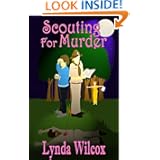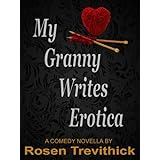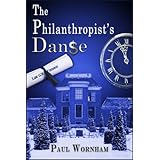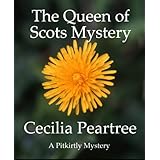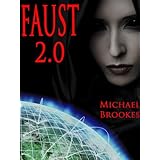This is the next instalment of Verity Long's murderous adventures. In saying that, you don't need to have read her previous outings, any filling in of characters is quickly done. If you have read the previous stories, you will feel at home in Verity's world.
This story takes her into the world of Brownies and Scouts, even though she doesn't particularly like children, she's the "love them and leave them quickly" type of woman, a bit like me, lol.
The story flows along quite nicely. I didn't bother trying to guess who the murderer might have been until some way through the story as my guess would chop and change many times as more information comes to light. Oftentimes I'd shout at Verity to go and talk to the Inspector, the mystery would be solved quicker, but of course, that would make a short and boring story. I do think Verity drinks an awful lot, she's always cracking open a bottle of wine or going to visit her lovely mates at the Wine Bar,
Again, a very enjoyable easy read.
http://www.amazon.co.uk/dp/B00E631HXQ/?tag=joookuf-21
Monday, 29 July 2013
Sunday, 28 July 2013
My Granny Writes Erotica by Rosen Trevithick
As soon as I saw this book was available I had to have it.
Finding herself in debt, Betty needs money and fast. She's written the best book she ever could, but nobody wants that. So she decides to cash in on the new craze, but has no idea about anything much more than missionary or doggy.
I think I read most of this with a smile on my face. I read it in one sitting, it's not long, a nice novella length and my only complaint is I could have read more and more of it.
This is certainly not for children, but the adult stuff is tongue in cheek. It was a very enjoyable read
Finding herself in debt, Betty needs money and fast. She's written the best book she ever could, but nobody wants that. So she decides to cash in on the new craze, but has no idea about anything much more than missionary or doggy.
I think I read most of this with a smile on my face. I read it in one sitting, it's not long, a nice novella length and my only complaint is I could have read more and more of it.
This is certainly not for children, but the adult stuff is tongue in cheek. It was a very enjoyable read
Labels:
KUF,
Rosen Trevithick
Wednesday, 24 July 2013
Interrogating Philip Whiteland
If you want to know anything more about my next subject, read one of his books, they are all about him.
How do you strike the balance between writing something you want to write and writing something that people want to read, in terms of the compromises you make, if any?
How do you strike the balance between writing something you want to write and writing something that people want to read, in terms of the compromises you make, if any?
I mostly write
non-fiction stories about growing up in the 1950s and 1960s. This wasn’t what I intended to do. My original aim was to write humorous fiction
but I couldn’t interest anyone in that.
However, I wrote a piece for a local competition about a playing field
we used to use as children (“The Wreck”) and, although it didn’t win it (or
even get placed) it was included in the anthology of stories that was
published. This encouraged me to write
similar stories in the same vein for our local newspaper’s nostalgia supplement,
and I’ve been doing the same ever since.
So you could say that I’ve been steered into writing what people want to
read, and it turns out that I’m not bad at it.
I think my original hope was that the world would read my ‘nostalgedy’
pieces (what happens when you combine nostalgia with comedy) and say “Wow, this
bloke can write, we should encourage him to write fiction”, but of course it
doesn’t work like that. I’m glad people
like what I write and it’s great to have the opportunity to grow an audience,
which I never thought would ever happen.
What excites, attracts or appeals to
you about the genre(s) you write in.
I find it
relatively easy to write about my childhood because I’ve discovered that I have
a fund of stories to tell. In fact, I
often start to write about one thing and find that the action of doing so
generates further memories that I had completely forgotten about. Putting myself back into the situations and
reliving the feelings, sensations and atmosphere is something I’ve become quite
adept at achieving.
Do you have a box, drawer, folder etc
where you keep thoughts and ideas for future stories? Such as names you have
come across, bits of dialogue, ideas, characters - even if you have no idea
when you might use them?
I know that
I should do this, and I have tried carrying a notebook around with me so that I
can capture any stray ideas or memories, but I tend to forget to do it (blame
it on my age). If I have a particular
idea, I usually just keep churning it over in my mind until I’ve got something
roughly shaped out that I can transfer to paper (or hard disk, I suppose) at
some point. I tend to have these really
good ideas just as I’m going to sleep (no, nothing like that, I mean story
ideas), and always say that I’ll remember them when I wake up, but I don’t.
How do you manage plot bunnies (ideas
that invade your mind that aren’t usually helpful to the story you’re writing
but breed like...er...bunnies)?
I love the
idea of ‘plot bunnies’! In all honesty,
I tend to follow any stray ideas and see where they lead me. This makes for a somewhat discursive style,
but I like it that way. My one and only
(to date) excursion into full-length fiction (‘Jambalaya’) was written in
entirely the wrong manner in that I wrote it in the same way that you would
read it. I simply started at the
beginning and then followed the story wherever it took me, cracking jokes along
the way. I know that isn’t how it’s
supposed to be done. So, I guess the
bottom line is that I don’t manage the ‘bunnies’, they manage me!
How much of you is in your
characters? Which of your characters is the you that you’d most like to be? Or
be with ?
I don’t have
characters as such. As all of the
stories are about me growing up, then I couldn’t identify with the main
character any more than I do. Mind you,
I wouldn’t mind going back and doing it all again with the benefit of
hindsight.
Do you become so wrapped up in your
writing that your spouse wonders if they're married to you or one of your
characters?
Oh yes. That business of churning a story around in
my mind for days on end does tend to make me a little distanced from reality at
times.
What type of book do you like
reading? Is it the same genre as you write?
I read an
awful lot of humour, particularly humorous essays by the likes of Bill Bryson,
Alan Coren and Stuart Maconie. I’m also
trying to collect all the books of P.G. Wodehouse. However, since I’ve had my Kindle I’ve been
developing a more eclectic taste by snapping up free books as they become available.
What lengths do you go to to convince
us readers that your book has the X factor?
I don’t
think that I do. I like my readership to
grow organically, as one reader recommends something to another. Having said that, I’m willing to accept
overnight success as much as the next person, it just seems to be taking a
while.
How do you feel when a reader points
out the spelling mistake(s) you have made?
Annoyed,
because I should have picked them up myself.
Doesn’t often happen, although I do occasionally have problems with
possessive apostrophes.
What do you like most about visiting KUF/GR/forums?
I’ve always
been heartened by the amount of support that is offered and the general
friendliness.
What is on your near horizon?
I’m toying
with the idea of a short compilation of Christmas pieces with a view to helping
people get in the right spirit. If it
happens, I’ll be aiming for an October launch.
Where can we find you for more
information?
Well,
there’s my blog at http://www.philwhiteland.blogspot.co.uk/ or
you can find all of my books and a bit about me at my Amazon author page http://www.amazon.co.uk/Philip-Whiteland/e/B004SBQSHG/ref=ntt_athr_dp_pel_1
Labels:
Interview,
Philip Whiteland
Friday, 19 July 2013
Auto by David Wailing
Auto is the collection of David Wailing's Auto stories into one book but ties them together nicely.
The author has created a future a decade from now, whereby all the social media needs of society is tied into having an "auto" that screens out all the rubbish and automatically replies for you. The Smart phone has gotten a lot smarter.
I had read the individual stories when they were originally released, but they held up for a second read. I nearly skipped one to get to a new story, but soon went back to read them in order. Reading them a second time and in one sitting revealed connections that I'd not noticed when I read them separately.
I may have given some of the individual stories 4 stars previously, but as a whole I feel they are enhanced by being brought together.
In all, a wonderfully scarily potentially accurate future that I'm not sure I want to embrace.
http://www.amazon.co.uk/dp/B00DY1F9VM/?tag=jookuf-21
The author has created a future a decade from now, whereby all the social media needs of society is tied into having an "auto" that screens out all the rubbish and automatically replies for you. The Smart phone has gotten a lot smarter.
I had read the individual stories when they were originally released, but they held up for a second read. I nearly skipped one to get to a new story, but soon went back to read them in order. Reading them a second time and in one sitting revealed connections that I'd not noticed when I read them separately.
I may have given some of the individual stories 4 stars previously, but as a whole I feel they are enhanced by being brought together.
In all, a wonderfully scarily potentially accurate future that I'm not sure I want to embrace.
http://www.amazon.co.uk/dp/B00DY1F9VM/?tag=jookuf-21
Thursday, 18 July 2013
The Philanthropist's Danse by Paul Wornham
A rich man calls together 12 members of family and friends for a week in his house. They find out he is dead and they must decide amongst themselves how to split his massive fortune. If they don't sort it out within a day, they lose 20% of it. And 20% more the next day, etc
This looked a good blurb and the first chapter got me intrigued. Yes, splitting it 12 ways would be sensible, but the family think they deserve more than the friends and the friends say if the father wanted you to have it, wouldn't he have given it to you. And so starts the infighting and recriminations and secrets.
I really enjoyed this book. It perhaps could have done with losing a little in the middle, but in the main, this was gripping and made me want to find out more. As more is revealed about the characters, your views were changed as to who was nice and who wasn't. I do recommend this one.
http://www.amazon.co.uk/dp/B0057J4ZMI/?tag=jookuf-21
This looked a good blurb and the first chapter got me intrigued. Yes, splitting it 12 ways would be sensible, but the family think they deserve more than the friends and the friends say if the father wanted you to have it, wouldn't he have given it to you. And so starts the infighting and recriminations and secrets.
I really enjoyed this book. It perhaps could have done with losing a little in the middle, but in the main, this was gripping and made me want to find out more. As more is revealed about the characters, your views were changed as to who was nice and who wasn't. I do recommend this one.
http://www.amazon.co.uk/dp/B0057J4ZMI/?tag=jookuf-21
Tuesday, 16 July 2013
Interrogating Kate Baggott
My next interrogation is with Kate Baggott, author of short stories.
How do you strike the
balance between writing something you want to write and writing something that
people want to read, in terms of the compromises you make, if any?
When
it comes to writing, I don’t compromise. There is enough compromise in my daily
life and writing is the one area where I have complete control. I do value and
take editorial advice if someone takes the time to give it to me. I work with
the same fiction web sites and literary journals again and again so I build
relationships with their editorial staff that are really satisfying.
What excites, attracts or
appeals to you about the genre(s) you write in?
I
write short stories, but I write in series or collections so I can stay with
certain character and their life events for a long time. My goal is to make
each piece stand alone while creating an entire society the action revolves
around. It is something I studied in school and between Munroe, Atwood, Mowatt
and other Canadian writers I have a whole cultural tradition to learn from.
Short
stories are also about time management. I have to earn a living too. Between
teaching, journalism and ghost-writing, the time I have to write fiction is
short and precious, but also carefully controlled. I can write a perfect moment
in the time I have. To write a perfect novel, I would need more time…and
perhaps a better capacity for giving up control.
Do you have a box,
drawer, folder etc where you keep thoughts and ideas for future stories? Such
as names you have come across, bits of dialogue, ideas, characters - even if
you have no idea when you might use them?
I’m
not very organised in terms of keeping track of ideas. I have lots of them all
the time. When I have an idea, I play with it and imagine it and dream it. By
the time I sit down, I can usually spill it all out. That doesn’t mean the work
is good. I usually get it all out and then go back to it later to see what is
there. Some pieces have not been published until 10 years after I wrote them.
Some of that is about content and style fashions, but some of it is about not
being able to edit and form properly until the story has lived alone for a
while.
How do you manage plot
bunnies (ideas that invade your mind that aren’t usually helpful to the story
you’re writing but breed like...er...bunnies)?
Sometimes,
plot points develop on a subconscious level and will be picked up at an
essential moment as the writing progresses. You don’t know what you might need
until you know exactly what you are doing. My approach is to write out
everything all at once and slice and dice later.
How much of you is in
your characters? Which of your characters is the you that you’d most like to
be? Or be with?
One
of my friends claims that all of my characters are me all the time, but I
generally don’t re-write my autobiography as fiction.
One
of my characters, Finnegan, is a teenage boy and I created him out of regret.
When I was a teenager, I would have grown up more easily if I had had a
boyfriend like Finnegan. Stories about Finnegan have won awards and readers
seem to like him. And yet, I’ve been working on stories about him for years,
but I can’t finish the collection because teenagers are kind of tough to live
with.
In
Love from Planet Wine Cooler, which
is available as a collection, things were very much about closing doors on the
past. I was Marina
Do you become so wrapped
up in your writing that your spouse wonders if they're married to you or one of
your characters?
To
be completely honest, my marriage is a mess and I would be lying if I said my
writing was not part of how we got into relationship disaster. But, in dealing
with heart-break and stress and constant worry, writing has been my greatest source
of comfort. There is no emotional chaos when I sit down and work out the
moments that I think create meaning. When I won the America
What type of book do you
like reading? Is it the same genre as you write?
Right
now, I’m reading nothing but Alexander McCall Smith. I’ve got an episode from Scotland Street
What lengths do you go to
to convince us readers that your book has the X factor?
Journals
and fiction sites that are run by great editors give me the chance to sing for
their metaphoric bar or pub patrons before I have to fill a stadium with book
readers. In between those events, I keep humming so my voice stays warm while I
wait for an open ear. When I find that, I start at a whisper in the reader’s
ear and slowly increase the volume until they are listening to my song and
harmonising during their own chorus.
I’m
as annoyed by all the indie author marketing noise as everyone else, so I don’t
automate “buy my book” tweets or spam people. I just try to be where interested
people are. There is also an element of need. An acquaintance recently told me
that she read Love From Planet Wine
Cooler as her own marriage was ending and that it brought her comfort
because it gave her permission to re-think her own history and her own future.
Those issues of timing are hugely important. If my work is there when a reader
needs me, even if it is only one reader ever, then I have done what an author
should do.
How do you feel when a
reader points out the spelling mistake(s) you have made?
I
express my thanks for their effort and my deep embarrassment. Sometimes,
though, spelling mistakes are an issue of using Canadian spelling rather than UK Europe
and worked for US publications, I get as confused over which standard to use
when, but my heart is in my Canadian dialect.
What do you like most
about visiting KUF/GR/forums?
I
mostly lurk to observe how readers approach and choose books to read. Deciding
to share the experience of reading the same book is an amazing event. Talking
about a movie or a TV program is becoming less commonplace the more fragmented
and solitary our viewing habits become. I’m going to be watching very carefully
to see how books fill the void.
What is on your near
horizon?
In
September have a short story coming out in an anthology called Friend. Follow. Text. It’s a collection
of stories by various authors inspired by how we use social media. I think it
will teach us a lot about what is inspiring writers right now. I’m also working
on a series of stories called Dry
Stories and pieces from it are just starting to appear online and in journals.
I hope to have the series finished by year-end and all the pieces published by
the end of 2014. Then, I’ll have them available as a collection in 2015.
Where can we find you for
more information?
Goodreads,
Twitter, and Facebook. I love social media. I collect all of my interactive
activities together on my web site http://www.katebaggott.com
Labels:
Interview,
Kate Baggott
The Queen of Scots Mystery by Cecilia Peartree
This is the latest instalment from the Pitkirtly gang.
By now, I feel I know this bunch, but as usual, I'm kept on the edge of my seat wondering what's going to happen. The group of characters gets larger each time as characters introduced in previous books get a bit more than bit parts.
Again, the story revolves around Christopher and as usual, he's a bit clueless as to what's happening. A murder has taken place and Ameryllis is miffed that she's not around to sort things out.
I enjoy reading this series as I feel I'm part of the family and again I wasn't disappointed. This is another cracker of a read.
https://www.amazon.co.uk/dp/B00DPYPD0K/?tag=jookuf-21
By now, I feel I know this bunch, but as usual, I'm kept on the edge of my seat wondering what's going to happen. The group of characters gets larger each time as characters introduced in previous books get a bit more than bit parts.
Again, the story revolves around Christopher and as usual, he's a bit clueless as to what's happening. A murder has taken place and Ameryllis is miffed that she's not around to sort things out.
I enjoy reading this series as I feel I'm part of the family and again I wasn't disappointed. This is another cracker of a read.
https://www.amazon.co.uk/dp/B00DPYPD0K/?tag=jookuf-21
Sunday, 14 July 2013
Faust 2.0 by Michael Brookes
This is the story of an evil entity coming into being and taking over the internet. This being likes to work its way into vulnerable people's lives by promising them what they want in return for "just one favour"
This story is a mix of high tech and creepiness. I could imagine this being played out on the screen as the descriptions of the characters and scenes were very well written. I enjoyed this book very much indeed.
http://www.amazon.co.uk/dp/B00CTA3YIE/?tag=jookuf-21
This story is a mix of high tech and creepiness. I could imagine this being played out on the screen as the descriptions of the characters and scenes were very well written. I enjoyed this book very much indeed.
http://www.amazon.co.uk/dp/B00CTA3YIE/?tag=jookuf-21
Subscribe to:
Comments (Atom)
